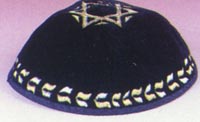|
|
Jewish World Review /Feb. 2, 1999 /16 Shevat, 5759
Dr. Laura
(JWR) --- (http://www.jewishworldreview.com)
"I WAS DEFINITELY READY to steal those yo-yos."
No one in the synagogue was prepared to hear the venerable rabbi
admit to
such an intent. After all, aren't holy people perpetually and perfectly
holy?
Aren't those who preach free from sin and sinful thoughts? If they
aren't pure
in thought and deed, how can we "civilians" consider, much less aspire
to, such
lofty ideals?
Interesting questions all, but sorely missing in insight and
understanding
of the truth of the human psyche and soul.
This day was different -- they wanted
to include him in their group because they had something "special"
planned.
He was thrilled! To finally be included and accepted by these older
boys was
a joy past rational comprehension.
They had a plan. They were going to a small mom-and-pop store to
steal
yo-yos. One boy was the lookout in the back of the store, another in the
front.
The third boy was assigned the task of distracting the store owner. And
since
our small rabbi-to-be was wearing a heavy coat with lots of large
pockets, he
was assigned the job of actually stealing the yo-yos.
The truth was that he was
being set up to do the deed so that he would be the one in trouble if
anything
went wrong.
He remembered knowing it was wrong to steal --- stealing was one of
the Ten
Commandments, basic tenets of decent, religious people. He knew it was
wrong,
but he wanted so much to be accepted by these older boys, to be one of
them. He
hesitated, anguished and worried. Should he reconsider? He finally
decided to do
it because, after all, it was only a few wooden toys with strings ---
not
something that would truly hurt the shop owner to lose.
What happened? He realized that he could rationalize right and wrong
by
minimizing the impact to the shop owner. He realized that he could do
something
illegal and perhaps not get caught and punished. He realized that he had
it in
him to compromise his very soul in order to gain acceptance into a
group.
But when he touched that symbol of respect for G-d, he realized he
could not
do something sinful and not have G-d know and be disappointed in him.
That
accidental touch reminded him of his obligation to more than his
popularity,
impulse, ego and curiosity. He was reminded of his obligation to walk
with G-d,
to be holy, not because he was "the preacher's kid" but because he was a
child
of G-d. That's what the kippah "told" him.
The moral of that story is that even a religiously drenched rabbi's
kid
needs reminding --- we all do. That's the point of religious services,
religious
rituals, religious objects around the house, prayer and Bible study,
and
religious symbols around our necks, and hats on our heads. They are to
educate,
inspire and remind us of our ultimate obligations --- which are often
difficult
to remember or care about once we are absorbed in our personal, narrowly
focused
terrestrial existences.
I was listening to a radio talk show recently in which the host took
the
position that folks using ethnic and religious names for children
instead of
anglicized versions were clearly separating themselves from the American
concept
of "one nation." One caller agreed, but said that he gave his daughter
the
Hebrew version of Elizabeth not to separate her from America, but to
separate
her from what he perceived as the mainstream's lack of coherent morals
and
values.
By giving her a traditional, biblical name, he hoped she would be
reminded of the values that "used to be" and "ought to be" still.
He hoped that her name would be to her as the kippah was to
the rabbi: a
reminder of the goodness and morality that is expected of a decent human
being.
We mortals constantly require reminders --- even though we defensively
rail
against
 Rituals, icons remind us of our obligation to G-d
Rituals, icons remind us of our obligation to G-d
 The rabbi spoke of being a small child from a long line of Orthodox
rabbis
originally from Lithuania. He was being raised in a seriously religious
home and
was schooled at the Yeshiva. One day he came upon a group of three
slightly
older non-Jewish children who usually harassed him.
The rabbi spoke of being a small child from a long line of Orthodox
rabbis
originally from Lithuania. He was being raised in a seriously religious
home and
was schooled at the Yeshiva. One day he came upon a group of three
slightly
older non-Jewish children who usually harassed him.
 Just before he reached into the bin to liberate the yo-yos, he
nervously
brushed some hair from his face. As he pushed his bangs to the side, his
fingers
touched his kippah --- the yarmulke or skull cap religious
Jews wear as a sign of
respect to G-d. At that moment, his fate was sealed. He ran out of the
store
without the yo-yos and in fear of being beaten up by those disappointed,
would-be thieves.
Just before he reached into the bin to liberate the yo-yos, he
nervously
brushed some hair from his face. As he pushed his bangs to the side, his
fingers
touched his kippah --- the yarmulke or skull cap religious
Jews wear as a sign of
respect to G-d. At that moment, his fate was sealed. He ran out of the
store
without the yo-yos and in fear of being beaten up by those disappointed,
would-be thieves.

01/22/99: 'Consenting adults' don't always examine consequences
01/18/99: Day care no substitute for love of mom and dad
01/08/99: Don't use others' misfortunes to build your self-image
12/31/98: Tracking HIV-infected people makes good sense
12/24/98: How can we teach ethics without defining morals?
12/18/98: Parents afraid of firm values leave their children adrift
12/11/98: Spread righteousness by refusing to accept the 'code'